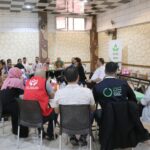This year’s World Mental Health Day in Syria comes amid an escalation in bombing of civilians in the Aleppo and Idlib countryside, resulting in cases of panic and horror and a large displacement movement, and causing many psychological disorders among a large number of residents and displaced people fleeing the bombing.
As the frequency of bombing intensifies, humanitarian needs increase and psychological problems worsen. Many patients and those who were exposed to bombing or lost a loved one are suffering from anxiety, post-traumatic stress disorder, depression and psychosis, as a result of accumulated psychological pressures, in addition to repeated displacement and poor economic and social conditions.
The reason for the large number of these cases is the delay in seeing doctors and specialized centers; due to the stigma, that society imposes on those visiting mental health centers and clinics. That forces some to resort to primitive treatments that may worsen the condition, in addition to the lack of encouragement and attention from the patient’s relatives, which leads some to relapse again even after they receive treatment.
Therefore, our teams are working on many projects that contribute to mental health. In addition to implementing several activities on World Mental Health Day to raise awareness of it. Our teams have held the “Mental Health in Crisis and Wars” symposium in cooperation with the Syrian Society for Mental Health, the Syrian supporters Society, the Syria’s Bright Future and Beit Salam for Consultation & Training.
The Ataa Association centers in Al-Bab and Azaz inside Syria; Kilis, Urfa and Rihanli inside Turkey, also held many activities that included children and mothers, in awareness sessions and the distribution of brochures, in addition to producing a visual report on mental health.
Since the beginning of the displacement movement and the exacerbation of the suffering of our people, our teams have been working for more than 10 years to confront the effects of the bombing and alleviate the suffering of the people, through our offices spread in various places in Syria and Turkey. And they have never hesitated to provide support and assistance and try to meet the increasing needs of our people with the prolonged suffering. In addition to providing shelter and counseling services through the hotline that we launched for rapid response to the displaced and those affected by the bombing.


